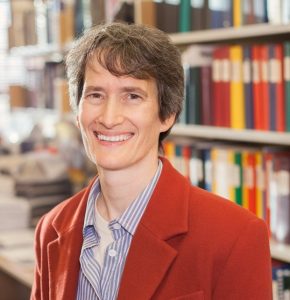
Message from the CMOS President: Resilience and Possibility in Challenging Times
– By Kimberly Strong, CMOS President and Professor & Chair, Department of Physics, University of Toronto –
Dear CMOS Friends and Colleagues,
As we go ‘to press’ with this issue of the CMOS Bulletin, Canada and the world are in the midst of major disruptions due to the COVID-19 pandemic. The resilience that we saw Canadians exhibit this winter will be needed more than ever as we face this new challenge. I’m thinking particularly of the Newfoundlanders who had to cope with multiple snowstorms, including the massive mid-January blizzard that dropped more than 90 cm of snow on the St. John’s area, and who did so with humour and community spirit. We will need a lot of that in the months ahead as we all take preventive action to reduce the spread of COVID-19, and later deal with the aftermath.

We watch the impact of COVID-19 on other countries with concern and sympathy, and hope that the actions being taken by all levels of government and by individuals will ‘flatten or plank the curve’ in Canada. Some of these steps were unthinkable just a few short weeks, or even days, ago. On the positive side, these actions demonstrate that we can change and respond radically in the face of a major threat. Canada’s policy response to COVID-19 has been strong and has included international coordination and recognition of the central role of scientific research to develop, test and implement measures to deal with the outbreak. It is interesting to contemplate why the speed of this response has been so much faster than effective action on climate change, as discussed, for example, in a recent article in The Conversation.
As we move ahead, we might keep in mind these words from the UN Secretary General: “… in managing this crisis, we also have a unique opportunity. Done right, we can steer the recovery toward a more sustainable and inclusive path. But poorly coordinated policies risk locking in — or even worsening — already unsustainable inequalities, reversing hard-won development gains and poverty reduction. … We have a responsibility to ‘recover better’. … We have a framework for action – the 2030 Agenda for Sustainable Development and the Paris Agreement on Climate Change. We must keep our promises for people and planet.”
The effect of the coronavirus quarantine on the atmosphere over China can be clearly seen in NASA Earth Observatory maps of nitrogen dioxide (NO2) concentrations measured by the Tropospheric Monitoring Instrument (TROPOMI) on ESA’s Sentinel-5 satellite. NO2 is an air pollutant emitted by motor vehicles and industrial activities; as these emissions were reduced during the Chinese quarantine, a dramatic reduction in NO2 was seen between January and February, and in 2020 relative to 2019. As air travel and other activities are now being scaled back globally, scientists will be watching the consequences for air quality and greenhouse gas emissions.
Closer to home, we are evaluating options for the CMOS Congress in Ottawa, which is scheduled for May 24-28, 2020. The Local Arrangements Committee and the Scientific Program Committee, along with the CMOS Executive, continue to monitor the rapidly evolving COVID-19 situation on a daily basis. We will inform CMOS membership and Congress participants of any changes, and updates will be posted on the CMOS Congress website.
I would like to note that this issue of the CMOS Bulletin marks the first with our new Editor, Nicole Renaud. She brings a decade of experience in working on water, climate, and Indigenous issues, some of which you can read about in this Bulletin article. I’m delighted to welcome Nicole to the CMOS community.
Finally, as we all adjust to the new reality of social distancing, self-isolation, travel restrictions, working at home, closure of schools, university courses moving online, businesses closing or restructuring, and the explosion of virtual communications, please stay connected and look after yourself and others, especially those more vulnerable.
Keep well.
Kimberly Strong
CMOS President, and Professor & Chair, Department of Physics, University of Toronto
Email: president@cmos.ca
CMOS Congress, COVID-19, international policy, Kimberly Strong, Nicole Renaud
